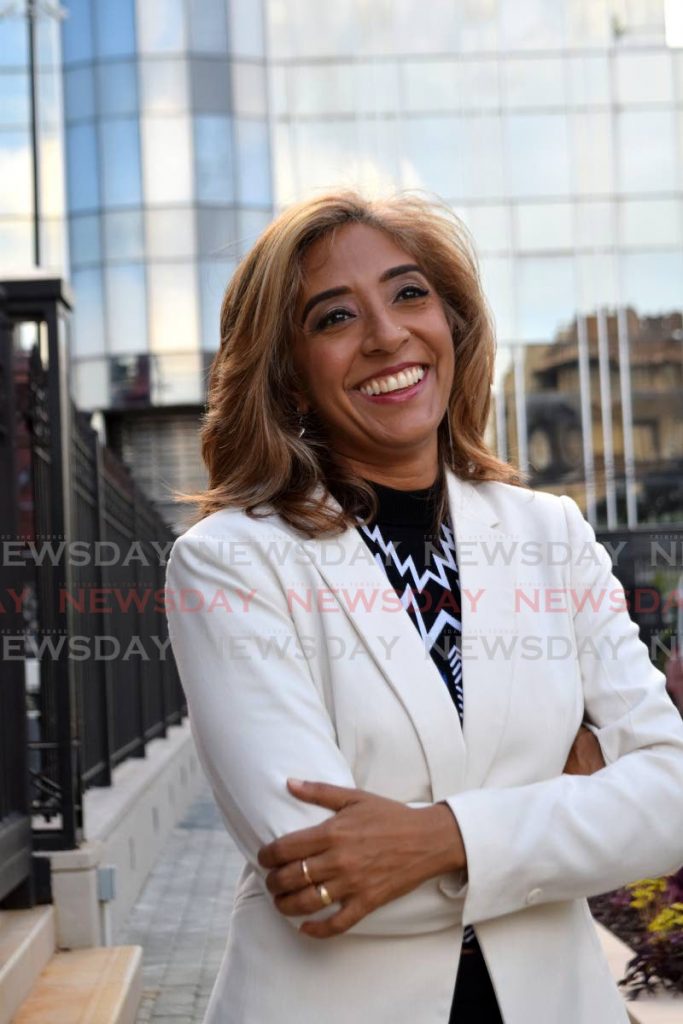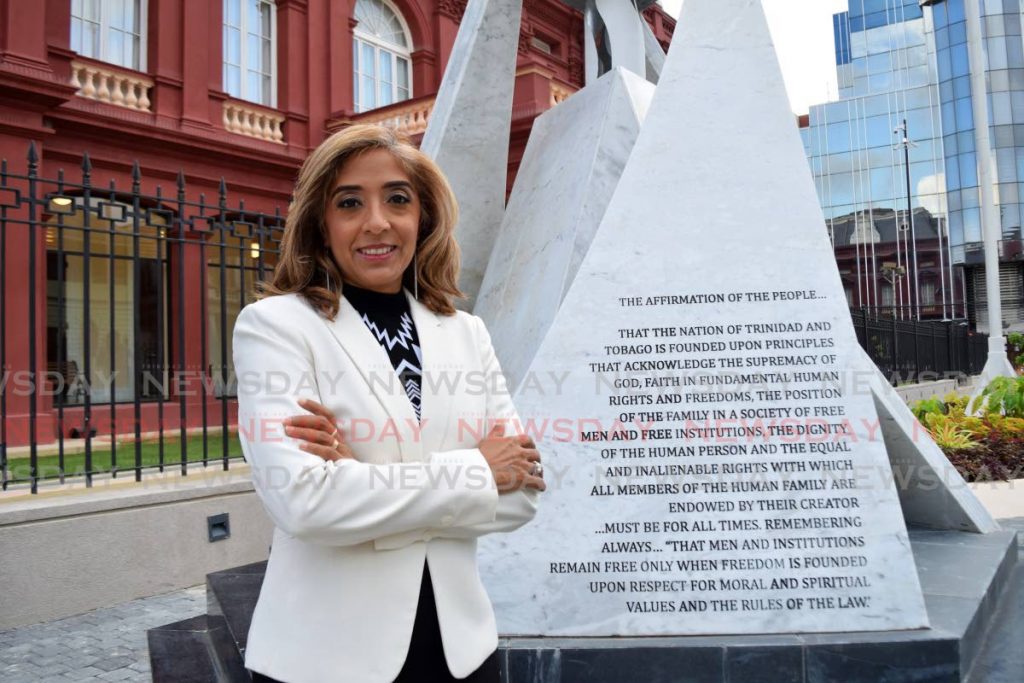Dr Gabrielle Hosein: Advocate for equality

When Dr Gabrielle Hosein spoke with WMN last week, she said, "There's so much to do with life, but in phases and stages." And that's just how Hosein approaches hers.
She is well known for her advocacy on a number of causes. As a lecturer and head of the Institute for Gender and Development Studies (IDGS) at UWI's St Augustine campus, a Newsday columnist and a parent, Hosein’s advocacy experiences are varied and far-reaching.
“The IGDS has a range of partnerships with UN organisations, civil society organisations, youth groups and state ministries. We work on issues of masculinities, gender-based violence, discrimination, reproductive rights, gender responsive budgeting, agriculture and fisheries, climate justice, migrant rights, women's leadership, child sexual abuse and incest, gender policy-making and so much more.
"The university is very supportive of our work, which enables us to be a vibrant social justice hub on campus,” she told WMN.
Her column, Diary of a Mothering Worker, enables her to “reflect on social issues as a citizen and advocate, as well as my own experiences as a woman and mother.” Through this medium, Hosein said she gets to be a storyteller who connects with the experiences of others and comment on public challenges and debates.
“Diaries are often associated with women, but have remained private. In this case, I wanted to break that open, experiment with form, sometimes write fiction, sometimes just share from my heart. As an old rapso poet, I intersperse rhyme and metre into lines in the column.”
Her favourite topics, though, are about personal things.
“Raising a daughter or finding love or struggling with a dilemma, because we often think that the important topics are about politics and the State, when in fact the issues that most take up our attention are in our families and homes.”
On September 30, Hosein took on a new advocacy role. She was sworn in by President Paula-Mae Weekes as vice chair of the Equal Opportunity Commission, which works towards the elimination of discrimination and the promotion of equality of opportunity.
“As vice chair, my role would be to impart my expertise and experience to the chairman (Ian Roach) and commissioners in carrying out the aims of the commission...through advocacy, public education, research and the conciliation of complaints. This could also involve strategic guidance to the operations of the commission, and filling in for the chairman when needed.”

Her 25 years of involvement in Caribbean feminist movement-building, she believes, can only add value to her work on the EOC.
“I am an expert in the struggle for social justice in which gender ideals, or beliefs about manhood and womanhood, can institutionalise and reproduce violence, inequity, rights violations and harmful expressions of power in the workplace, homes and communities.”She said citizens’ experiences of discrimination are informed by gender ideals and relations.
“Feminist analysis also allows for an understanding of how discriminatory experiences affect persons differently depending on their sex, age, health status, religion, race, sexual orientation or gender identity, or as persons with disabilities,” and she sees feminism as “a commitment to advancing justice in its broadest sense, guided by human rights conventions, law and policy, data and the needs of citizens for inclusion and protection.”Hosein said it was an honour to be appointed to sit on the EOC, and she will be guided, first by the law, the legal expertise in the commission, consultation with all relevant stakeholders, consensus and shared decision-making among the commissioners and the chairman.
The holder of a BA in political science from the University of Toronto, an MPhil in gender and development studies from UWI, and a PhD in anthropology from University College, London, 46-year-old Hosein lectures, supervises students, publishes her own research, represents the IGDS on various committees, and creates partnerships with the private and public sectors. Her titled work includes, Engaging Men to End Violence Against Women and Girls in the Caribbean: Expanding the Possibility Frontier (IDB); Gender Mainstreaming in National Development Planning (ECLAC); and Gender-Based Violence in Trinidad and Tobago (UN Women). She has written numerous journal articles and chapters in refereed books and has also edited scholarly work.
“My role as head is to provide strategic direction and day-to-day oversight as well as to draw on the ideas of a small but dedicated team of young academics and activists in continuing to envision our role in transforming the Caribbean, producing relevant knowledge, mentoring another generation, building movements, supporting gender mainstreaming, and doing it all with innovation and creativity.”All this has continued even with the restrictions brought on by the covid19 pandemic. The switch from in-person to virtual classes may have been tougher on some students than others in a number of ways, but Hosein said she and her staff remain committed to giving each student a fair chance. “We do miss the face-to-face discussions in lectures with students, as they are always honest, transformative – and sometimes hilarious…
"We remain available to students so they stay interested in the learning. We are invested in instilling skills our students can use to create a better space around themselves, whether it be in the workplace or their private spaces – quite frankly, a great deal of the IGDS’ ethos aligns with that of the EOC.”
And like most other professional mothers, Hosein said the restrictions have forced her to reformat the way she did things before March 2020.
“I'm now caring for my daughter at home full time while working full time. Some days, my brain and energy are overwhelmed,” especially with all the additional domestic duties added to work and childcare.

“It's harder to focus the way one would at an office. At the same time, I haven't spent so much time with my daughter since she started pre-school.” While she said it’s not all quality time, she welcomes the hugs in the middle of the day and the lunch dates on other days.
“There's a lot of sweetness amidst being exhausted.”
She’s also had to put the brakes on her career goals, “in particular in relation to publishing, which requires quiet space to read, think and write. But all of us are affected in one way or another, and the only option is to get up and dust off each day, and tell yourself you are doing the best you can.”Fortunately, she does not have to do it alone.“I'm a mother and professional, with an extremely supportive and loving partner, without whom I couldn't achieve anything in the day.”
Still, she said there are days when she is convinced she is missing out on too many of the important parts of motherhood.
“I think we expect people to be perfect. But whatever I do in one day is the best I could manage, and I make up on other days because there are only so many hours, so much capacity, and health, family and love which also have priority.”And because she tries to use the time spent with her daughter as teaching moments, Hosein said they have a lot of conversations about things like hard work and gratitude. And of course, other things are bound to come up.
“We talk a lot about the issues I'm working on so she understands feminism, capitalism, women's unequal responsibility for care, the limitations on women's leadership, and all kinds of issues as much as a nine-year-old can.
“She's had to do a lot more chores now that she is home all day with me, and that's been great for her understanding the challenges of balancing work and family. She's curious and talkative, and everything is a teaching moment.
“I tell her a lot how much I learn from her, too. She's very honest in the ways she thinks I should improve, and I'm trying to create the kind of relationship where there is open communication.”Hosein understands and appreciates the importance of self-care, especially as it relates to maintaining a healthy mind.
Pre-covid19, her appreciation of nature was her go-to outlet for stress relief.
“The beaches, rivers and forest hikes were that kind of rejuvenation for me, so I'm waiting for the chance to be in nature and under waterfalls again.”
But with very little downtime in what she describes as long, manic days, she said she has had to find alternative ways to regenerate: “creative projects, or to try to quietly read in areas I like. I exercise three times a week, with a fantastic woman-run, women-only small business called SHE Casa which provides on-line training and dance fitness, and that time keeps me sane.”But pandemic or no pandemic, Hosein, although well accomplished, is already looking past the horizon to the many projects that lie ahead.“I want to publish a scholarly book about Caribbean feminisms that's been in my head for about five years, but I haven't had the space to think and write while being head of the institute.
“I also want to make art that thinks about what post-indenture feminisms mean, and have a project planned which involves designing saris. My dream is to see those saris on fashion runways in other sites of indenture, such as Fiji and Mauritius, in ways that give our histories contemporary life.
"As Caribbean feminist Peggy Antrobus once told me, ‘Women can have it all – just not at the same time.’”


Comments
"Dr Gabrielle Hosein: Advocate for equality"